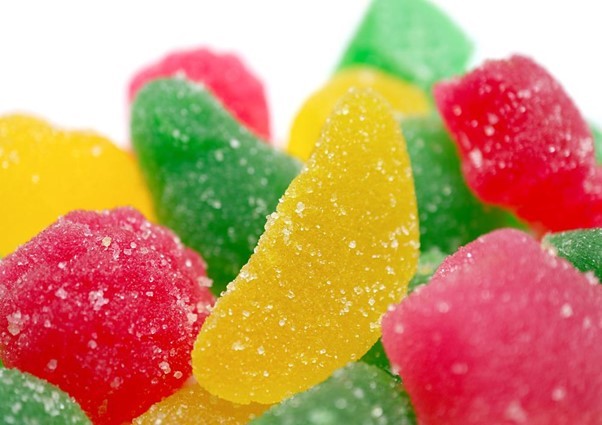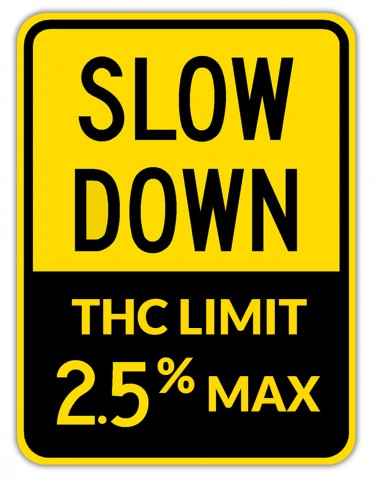Cannabis News
When Conservatives Regulate Cannabis – Florida Bill Would Cap THC at 10% on Smokable Marijuana
Published
10 months agoon
By
admin

On January 5, Florida Representative Ralph Massullo introduced House Bill 1269, which underwent its initial reading on January 9. If approved, this legislation aims to establish restrictions on the potency of cannabis products, particularly in the event of the legalization of adult-use cannabis.
The proposed bill outlines stringent limitations for smoking products, concentrates, and edibles. According to the original filed version, marijuana intended for personal use must not exceed a tetrahydrocannabinol potency of 10%, whether measured by weight or volume, for smoking products. Additionally, for all other forms of marijuana, excluding edibles, the final product must not surpass 60% tetrahydrocannabinol. In the case of edibles for personal use, the bill specifies that they must not contain more than 200 milligrams of tetrahydrocannabinol, and each serving portion of an edible should not exceed 10 milligrams of tetrahydrocannabinol.
Massullo’s Proposed Potency Limits and Other Legislative Developments
Massullo suggests considerably lower potency percentages than those seen in other state’s potency limitations. Furthermore, the word “potency” is defined in detail in the text of HB-1269, involving both the total milligrams of tetrahydrocannabinol and the relative potency of cannabinoids. When a patient or caregiver receives the finished product, this contains the total of delta-9-tetrahydrocannabinol plus 0.877 multiplied by tetrahydrocannabinolic acid, as well as delta-8-tetrahydrocannabinol and cannabidiol, which is the total of cannabidiol plus 0.877 multiplied by cannabidiolic acid.
Several other bills have been proposed for the 2024 legislative session in Florida. House Bill 1435 aims to establish “Registry Identification Cards” for military veterans. House Bill 1497 seeks to exempt specific applicants from medical cannabis treatment center licenses. Meanwhile, Senate Bill 94 suggests reduced penalties for individuals possessing 20 grams of cannabis or less for the first three violations, and Senate Bill 166 proposes protections for medical cannabis patients who are public employees.
Massullo envisions that the legalization of adult-use cannabis is imminent in Florida, particularly with the 2024 ballot approaching later this year. Smart & Safe Florida, an initiative that was announced in June 2023, claims to have gathered enough signatures to qualify for the ballot in the upcoming election.
Trulieve’s Support and Smart & Safe Florida’s Legal Battle
The primary financial support for the campaign is derived from the multistate entity Trulieve. In a statement, Trulieve CEO Kim Rivers emphasized the company’s commitment to consumers, stating, “Our investment reflects our strong belief that Floridians are ready to enjoy the freedom of using cannabis for personal consumption—a liberty currently embraced by over half of America’s adults.” Rivers expressed enthusiasm over the campaign reaching a significant milestone with over 965,000 validated signatures from across the state, indicating widespread support. The goal is to have the initiative on the ballot in the upcoming November election.
However, the initiative faced opposition from Florida Attorney General Ashley Moody shortly after gathering sufficient signatures. Smart & Safe Florida, the organization behind the initiative, defended the petition language, emphasizing its conservative drafting with the guidance of the court. They anticipated the court’s adherence to a deferential standard of review, asserting that the language strictly complies with the law and the Florida constitution, providing voters with the opportunity to decide on the matter.
The Florida Supreme Court will hear oral arguments in November 2023. In a statement released after the hearing, Smart & Safe Florida expressed confidence that the wording was written in compliance with the court’s stated requirements. The group is hoping that the court would acknowledge the stern adherence to the law, allowing Florida’s residents to exercise their sovereign right to vote on a proposed constitutional amendment. The case has not moved further as of yet, therefore it is unclear what will happen to Smart & Safe Florida’s effort.
Support for Cannabis Legalization and the Struggle for Grassroots Initiatives
As per data furnished by the University of North Florida’s Public Opinion Research Lab, 67% of survey respondents expressed their support for the legalization of adult-use cannabis in Florida. In contrast, only 28% indicated a negative stance, while 5% either did not know or chose not to respond to the question.
Recently, another 2024 ballot initiative related to cannabis, which aimed to permit medical cannabis patients to cultivate their plants at home, was terminated. In late December 2023, activists associated with a group named Wise and Free declared the withdrawal of the initiative, citing insufficient signature collection. Advocate Moriah Barnhart commented on the challenges faced, stating, “The legislators are continually making it more challenging for us to pass constitutional amendments, favoring giant conglomerates and large corporations, leaving us at a disadvantage.”
The initiative necessitated 900,000 signatures, and the group also lacked the essential funding to effectively run the campaign. Barnhart elaborated, “Anticipating potential charges in the millions for late petitions, I couldn’t take the personal responsibility for those fees—particularly when donations weren’t keeping pace with expenses, let alone additional costs. Now, it seems that only billion-dollar companies and conglomerates have a voice in shaping Florida law.”
Public Response, Advocacy Concerns, and Industry Support
The unveiling of House Bill 1269 has prompted a diverse array of reactions from the public, including both staunch cannabis advocates and concerned citizens. Advocacy groups are voicing reservations regarding the proposed THC caps, emphasizing the potential limitations these restrictions may impose on the medicinal benefits of cannabis. Critics argue that patients requiring higher potency strains for specific medical conditions could face challenges accessing the most effective treatments. As the bill advances through the legislative process, the engagement of advocacy groups and the general public becomes integral to ensuring that the final regulations strike a balance between public health considerations and the therapeutic needs of patients.
Simultaneously, the notable endorsement of House Bill 1269 by major cannabis entity Trulieve adds an intriguing dimension to the unfolding narrative. Trulieve’s CEO, Kim Rivers, underscores the company’s commitment to consumer freedom and signals confidence in the readiness of Floridians to embrace personal cannabis consumption. However, questions loom about the potential ramifications for the cannabis industry, as the proposed THC limits may reshape market dynamics. The intersection of public sentiment, advocacy efforts, and industry reactions will undoubtedly play a pivotal role in shaping the final contours of cannabis regulations in Florida.
Bottom Line
In Florida’s evolving cannabis landscape, House Bill 1269, proposing a 10% cap on smokable THC products, has elicited a multifaceted response encompassing advocacy concerns, public sentiments, and industry dynamics. The bill’s stringent THC limitations have prompted cannabis enthusiasts and advocacy groups to express reservations about potential restrictions on medicinal benefits, emphasizing the importance of balancing public health considerations with patients’ therapeutic needs. Concurrently, the notable endorsement of the bill by cannabis entity Trulieve raises questions about its potential impact on the industry, hinting at a changing market landscape. Against this backdrop, the legal battles faced by initiatives like Smart & Safe Florida and the challenges encountered by grassroots movements underscore the complexities of shaping cannabis policies in Florida, where the outcome remains uncertain pending the Florida Supreme Court’s decision and the forthcoming November election.
CAPPING THC IN CANNABIS, READ ON…
You may like
-


Top 5 Delta 9 Edibles That Actually Work and Taste Delicious
-


The Latest in DEA Shenanigans? The Federal Agency Punts Marijuana Hearings into 2025
-


Dutch police find gnome made of MDMA during drug bust
-


Rejected applicants sue Minnesota over marijuana social equity licensing process
-


4 Ways Marijuana Can Help You Have A Better Thanksgiving
-


Can Big Alcohol Help The Cannabis Industry
Cannabis News
Top 5 Delta 9 Edibles That Actually Work and Taste Delicious
Published
8 hours agoon
November 23, 2024By
admin

Delta-9 THC is a powerful cannabinoid that offers a unique blend of relaxation and mental euphoria. Unlike other cannabinoids, Delta-9 provides a calming yet uplifting effect, making it ideal for those seeking stress relief or improved sleep.
The best Delta 9 gummies offer an easy, discreet way to consume this compound without the hassle of smoking or vaping. But with unlimited options on the market, choosing the one that best fits your needs can be hard. That’s why, after analyzing over 1200 customer reviews and 38+ expert recommendations, we’ve selected the top 6 Delta 9 gummy brands. These edibles are known for their potency, quality ingredients, and amazing effects.
Best Delta 9 Gummies in 2025
-
Exhale: Overall Best Brand for Premium Delta 9 THC Gummies
-
Budpop: Most Potent Delta 9 Gummies
-
High Test Gummies: Strawberry Diesel Live Resin Gummies – Hybrid for Energy
-
CBDMd: Delta 9 Gummies for Relaxation and Focus
-
CannaBuddy: Delta 9 Gummies with Various Flavor Options
-
HomeTown Hero: Delta-9 THC Gummies for Sleep
#1. Exhale: Overall Best Brand for Premium Delta 9 THC Gummies

Why Do We Love Them?
Exhale Wellness ranks as the top choice for Delta 9 gummies, offering premium, hemp-derived gummies that meet the 2018 Farm Bill regulations and contain less than 0.3% THC. The brand offers potent and diverse Delta 9 gummy options, including D9 + Caffeine, Live Resin D9, and unique blends with HHC and Amanita. Each gummy comes in various potency levels, combining minor cannabinoids like CBC, CBG, CBN, and CBD to enhance effects.
Customers highly rate Exhale’s gummies for promoting relaxation, pain relief, and restful sleep. Many find them delicious, fast-acting, and powerful, with some reporting a mild “high” within the legal THC limits.
Pros
-
100% organic ingredients
-
$20 off on the first order
-
Third-party lab-tested for purity
-
20+ other Delta 9 THC strains
Cons
Specs
-
Potency Options: Exhale’s Delta 9 gummies contain 100 to 500mg of THC per pack, offering balanced effects for various needs.
-
Packs Available: The brand offers gummies in different pack sizes, from individual to bundles of 2, 3, or 5.
-
Flavors: Exhale’s Delta 9 gummies come in delicious natural fruity flavors, including Apple, Berry, Fruit, Tropical Mix, and Strawberry.
-
Price Range: The small packs of 100mg cost $9.98, while larger extra-strength bottles cost up to $99.95.
#2. Budpop: Most Potent Delta 9 Gummies

Why Do We Love Them?
BudPop is a popular brand known for offering the 18 most potent Delta 9 gummies on the market. With powerful dosages ranging from 8 to 50 mg per gummy, BudPop’s gummies provide strong effects that appeal to new and experienced users. Their noticeable effects are perfect for those seeking relaxation, euphoria, or better sleep.
Available in various fruity flavors, such as Blueberry, Kiwi, Mango, Strawberry, and Watermelon, Budpop’s gummies are praised by customers for their delicious taste and smooth texture. Customers report enjoying the effects for 4-6 hours with these strongest Delta 9 gummies.
Pros
-
Excellent customer service
-
Several payment methods are accepted
-
Small-batch production for freshness
-
Vegan and cruelty-free
Cons
Specs
-
Potency Options: Budpop’s Delta 9 gummies range from 450mg to 1500mg THC per pack, offering a variety of strengths to suit different preferences.
-
Packs Available: The brand offers gummies in different sizes, including single packs or bundle options, such as 3-pack and 5-pack sizes.
-
Flavors: Budpop’s Delta 9 gummies come in various fruit punch flavors without artificial flavors or colors. Their gummies contain premium D9 THC distillate for a flavorful experience.
-
Price Range: Depending on flavor and potency, their gummies cost $19.95 for smaller packs and $99.95 for larger bottles.
#3. High Test Gummies: Strawberry Diesel Live Resin Gummies – Hybrid for Energy

Why Do We Love Them?
High Test’s Strawberry Diesel Live Resin Gummies—Hybrid is a top choice for those seeking an energizing boost with the added benefits of CBD. These gummies combine the effects of sativa and indica strains, which help improve focus and energy levels. Their gummies are ideal for daytime use, offering mental clarity and motivation while helping you stay calm and relaxed.
However, it is worth noting that the brand features a limited variety of Delta 9 strains compared to others on our list. On the other hand, many people love the sweet, juicy flavor and fast onset of effects these Strawberry Delta 9 edibles offer.
Pros
-
Balanced THC levels for beginners
-
Debit and credit cards accepted
-
Made from non-GMO ingredients
-
Easy refund policy
Cons
Specs
-
Potency Options: High Test’s Strawberry Diesel Live Resin Gummies offer 10mg of Delta 9 THC and 10mg of CBD per gummy, providing a balanced hybrid effect.
-
Packs Available: The brand offers only one bottle size containing 30 gummies.
-
Flavors: Their gummies feature a dynamic Strawberry Diesel Live Resin flavor, made with concentrated strawberry juice and all-natural ingredients with a hint of herbal tartness.
-
Price Range: One bottle of their live resin gummies costs $25, and customers can get 20% off when they buy six or more bottles.
#4. CBDMd: Delta 9 Gummies for Relaxation and Focus

Why Do We Love Them?
CBDMd offers a unique blend of Delta 9 THC gummies that are perfect for those seeking both relaxation and focus. These gummies provide a smooth and controlled experience, making them ideal for unwinding after a long day or staying focused during a busy afternoon. Their gummies are also designed for pain relief and better sleep, making them a favorite for therapeutic benefits.
Customers often praise the brand for offering a full refund policy within 60 days of purchase. However, some users have mentioned that the effects take longer to kick in than expected, and the gummies may not be as effective as the brand suggests.
Pros
Cons
Specs
-
Potency Options: CBDMd’s Delta 9 THC gummies provide 5 to 10mg of Delta 9 THC per gummy, offering a customizable experience.
-
Packs Available: The brand offers multiple pack sizes and combo options to suit your needs.
-
Flavors: Their gummies come in various delicious flavors, including Cherry, Dragon Fruit, Sour Watermelon, Lemon, and Tropical Punch.
-
Price Range: Their gummies cost between $34.99 and $39.99, depending on flavor options.
#5. CannaBuddy: Delta 9 Gummies with Various Flavor Options
Why Do We Love Them?
CannaBuddy’s Delta 9 gummies are known for their vibrant assortment of flavors and uplifting effects. From classic favorites like Apple Berry and Strawberry to more adventurous flavors like Dragonfruit, Black Raspberry, and Fruit Punch, these gummies provide a refreshing variety to elevate your routine. These gummies taste sweet without a strong hemp aftertaste.
However, it’s important to note that the brand does not produce its own Delta 9 gummies. Instead, it offers a diverse selection from various reputable brands in the cannabis industry, which may disappoint some customers.
Pros
-
Suitable for both new and experienced users
-
Discreet shipping
-
Natural taste with no fillers
-
10% off to all subscribers
Cons
Specs
-
Potency Options: CannaBuddy’s Delta 9 THC gummies are available in potencies ranging from 200mg to 2460mg per pack, catering to a variety of preferences.
-
Packs Available: The brand offers a selection of pack sizes and bottle options designed to suit diverse needs.
-
Flavors: Their gummies come in refreshing flavors like Sour Watermelon, Kiwi Lemonade, Tropical Kush, and Green Apple.
-
Price Range: These gummies are priced between $29.95 and $34.95 depending on the brands and size.
#6. HomeTown Hero: Delta-9 THC Gummies for Sleep
Why Do We Love Them?
HomeTown Hero’s Delta-9 THC gummies are a natural choice for those seeking restful sleep. Made with high-quality Delta-9 THC, these gummies help promote relaxation and unwind the mind, making them ideal for bedtime. They offer a balanced dose of Delta-9 that does come with jittery effects often associated with traditional THC products.
However, it’s important to note that while these gummies can help promote better sleep, they may not be ideal for everyone, as everyone has different needs and preferences. Still, their gummies have positive customer reviews.
Pros
-
Supports Veterans with sales
-
Early orders shipped same day
-
Free live chat
-
Buy now, Pay Later option available
Cons
Specs
-
Potency Options: HomeTown Hero’s Delta-9 THC gummies come in a range of potencies from 5mg to 100mg per gummy.
-
Pack Sizes: The brand offers gummies in single packs and bundle options of two or four packs.
-
Flavors: Some of their popular flavor options include cranberry and blueberry.
-
Price Range: HomeTown Hero’s Delta-9 THC gummies cost around $20 for a single pack and go up to $299 for combo sets of 6.
Benefits of Delta 9 THC
Delta 9 is popular among those seeking natural relaxation and stress relief. It interacts with the body’s endocannabinoid system to provide various benefits, including improved mood and reduced pain. Below are the key benefits of Delta 9 THC:
Relaxation
Delta 9 THC is well-known for its relaxing effects. It helps ease physical tension and promotes mental calmness. Many people use Delta 9 edibles evenings or weekends to unwind and prepare for restful sleep.
Its effects are soothing without feeling overwhelming, making it a popular choice for relaxation. Regular users often report feeling refreshed after unwinding with Delta 9. Incorporating these gummies into your routine can help you create a consistent way to de-stress.
Stress and Anxiety Relief
Stress and anxiety are common issues, and Delta 9 may offer relief by calming the mind. A small dose can reduce feelings of nervousness or social anxiety, helping users feel more at ease in challenging situations.
For those struggling with daily stressors, Delta 9 offers a calming solution. Many users report improved focus and clarity after using small doses. It is a natural way to manage mental strain without relying on synthetic medications.
Pain Management
Delta 9 can act as a natural pain reliever for issues such as arthritis, headaches, or muscle soreness. Many prefer Delta 9 edibles over traditional pain medications for their gentle and lasting effects without harsh side effects.
Delta 9 also helps reduce inflammation, which is a major cause of chronic pain. It is especially beneficial for athletes and active individuals in managing post-workout soreness and muscle recovery. Its natural effects make it a gentler and safer option for long-term pain management compared to traditional medications.
Uplifted Mood
Delta 9 is often used to improve mood and increase mental energy. It can help lift feelings of sadness or mental fatigue, making users feel more positive and motivated. This cannabinoid is a great choice for days when you need a mental boost.
Many users report feeling more optimistic and energized after taking Delta 9 gummies. They offer a gentle way to enhance emotional well-being without mood swings. They can provide a balanced uplift, making them an excellent choice for enhancing focus throughout the day.
How We Found the Best Delta 9 Gummies for You
Selecting the best Delta 9 gummies requires a detailed evaluation of their quality, effectiveness, and customer satisfaction. We analyzed various factors to ensure each product meets safety and potency standards. Here’s what we focused on to find the top choices:
Ingredient Quality
We prioritized gummies made from natural and organic ingredients. We preferred brands using non-GMO and chemical-free components. For example, BudPop and Exhale Wellness use organic hemp and avoid artificial additives, ensuring a safe and enjoyable product.
These high-quality ingredients also reduce the risk of side effects, making them suitable for a broader audience. Additionally, natural ingredients contribute to better flavors without compromising the product’s efficacy.
Certifications
Certifications are essential as they confirm a brand’s compliance with industry standards. We looked for certifications such as USDA Organic and GMP, which show product quality and safety.
Products from reputable brands with these certifications are generally more reliable. Certifications also ensure that the products meet legal requirements and have undergone rigorous testing for safety and consistency.
Lab Testing
Comprehensive third-party testing was a must. Products with transparent lab reports showcasing their purity and potency ranked higher. Brands like those on our list excel in providing clean and reliable Delta 9 edibles.
Lab testing ensures products are free from pesticides, heavy metals, and harmful chemicals, safeguarding consumer health. Transparent lab results also allow consumers to verify the THC content for a risk-free purchase.
Effectiveness
Customer reviews and feedback helped us understand the effects of each gummy. We looked for products that deliver consistent results, whether for relaxation, better sleep, or stress relief. Reputed brands are known for their reliable and balanced effects.
Consistency in results is crucial for first-time users and regular consumers alike, making trusted brands stand out in the cannabis market.
Flavor
The taste enhances the overall experience. We preferred gummies with natural, enjoyable flavors like watermelon, peach, and blue raspberry. Decent brands offer diverse flavor options that appeal to a wide audience.
Natural flavorings remove the bitterness of hemp and provide a pleasant treat for daily use.
Customer Satisfaction
Positive reviews from verified buyers were crucial. We assessed feedback on product effectiveness, shipping, and customer service. Brands like those on the list received high praise for their quality and user-friendly service.
Smooth delivery processes and responsive support teams also contribute to higher satisfaction ratings. High customer satisfaction levels often indicate a reliable and trustworthy brand.
How to Pick the Right Delta 9 Gummies?
With so many choices, finding the best Delta 9 gummies online can be overwhelming. A few simple factors can help you select a safe and effective product that fits your preferences. Here’s what to consider:
Find a Reputable Brand
Choose brands with a strong reputation and positive customer feedback. Trusted Delta 9 gummy brands like those featured are known for their consistent quality and clear product information.
A reliable brand ensures a safer experience. Look for customer reviews that highlight product effectiveness and overall satisfaction.
Check Third-Party Lab Data
Lab testing by third-party facilities guarantees purity and potency. The strongest Delta 9 edibles will have detailed reports showing THC content and confirming they are free of harmful substances.
Always review these reports to ensure transparency and safety. Independent lab testing adds credibility and ensures you’re getting a quality product.
Assess Hemp Source & Quality
The hemp source affects the gummy’s overall quality. Look for organic, non-GMO hemp products, preferably sourced from the USA. This ensures that Delta 9 THC gummies are free from pesticides and other harmful chemicals.
Organic hemp is also more likely to offer higher-quality cannabinoids and better overall effects.
Select the Right Potency for You
Delta 9 gummies have varying strengths, from 5mg to 25mg per piece. Beginners should start with lower doses, while experienced users can opt for stronger Delta 9 THC edibles.
Choosing the correct potency helps achieve the desired effects without unwanted side effects. Start low and increase gradually for the best experience.
Other Considerations
Flavors and prices also matter. Many brands offer enjoyable options like watermelon or peach for a better experience. Compare prices to find affordable yet high-quality gummies. Reading customer reviews can provide additional insights into flavor, effects, and overall satisfaction.
Optimal Dosage of Delta 9 Gummies
Finding the right dosage of Delta 9 gummies is essential to ensure a pleasant and effective experience. Since Delta 9 THC has strong psychoactive effects, knowing how much to consume can help you avoid discomfort. Here’s a guide to help you determine the optimal dosage for your needs:
Start Low and Go Slow
If you’re new to Delta 9 THC or edibles, it’s important to begin with a small dose. Start with 5 to 10 mg of Delta 9 THC. Edibles take longer to kick in, usually between 30 minutes to 2 hours, so be patient. This allows your body to adjust without feeling overwhelmed.
Understand Your Tolerance
Your tolerance to THC will play a role in how much you need. If you’re a beginner, start with a low dose. Experienced users may need a higher dose to feel the effects. Regular users might find that 10 to 15 mg works best, while those with a high tolerance might need 20 mg or more.
Gradually Increase as Needed
Once you’ve tried a small dose, you can gradually increase it if needed. If 5 mg felt too mild, try 7.5 or 10 mg next time. Always give your body enough time to adjust to avoid taking too much at once.
Pay Attention to Labeling
Always check the label for THC content per gummy. Reliable brands like Exhale and Budpop provide clear and accurate labeling to ensure you know exactly what you consume. This helps you make informed decisions about your dosage.
Consider Your Goals
Your reason for using Delta 9 gummies can affect your dosage. Lower doses (2.5-5 mg) may be enough for anxiety or mood enhancement, while higher doses (10-25 mg) may be required for pain relief or sleep. Knowing your goals will guide your dosage choice.
Other Types of Delta 9 THC Products
Delta 9 is available in various forms, offering different experiences and benefits. If you’re looking for something beyond gummies, here are some other popular Delta 9 THC products to consider. Each offers unique effects, making choosing based on your preferences easier.
Delta 9 Chocolate
Delta 9-infused chocolate is a great alternative to gummies for those who enjoy edibles with a smooth texture. Available in milk, dark, and white varieties, chocolate bars often contain several doses in each square.
This makes it easy to control your intake. However, remember that chocolate needs to be stored properly to avoid melting.
Delta 9 Drinks
Delta 9 drinks provide a refreshing way to enjoy THC, with options like sodas, teas, and even coffee. The effects typically take 30 minutes to an hour to set in.
They’re discreet and convenient, perfect for social gatherings where gummies or smoking might not be ideal. These drinks come in various flavors and can be a fun, relaxing way to unwind after a long day.
Delta 9 Capsules
Capsules offer a no-fuss way to consume Delta 9. Each capsule contains a pre-measured dose, making it easy to manage your intake.
They are ideal for those who prefer not to smoke, vape, or chew edibles. While they offer convenience, it’s important to note that you can’t adjust the dosage once you take a capsule.
Delta 9 Vapes
Delta 9 vapes are a popular choice for those who prefer inhalation. The effects are felt almost immediately because THC is absorbed quickly through the lungs.
Vape pens are portable and come in both disposable and reusable options. Disposable pens are great for beginners, while reusable ones are more economical over time.
FAQs about Best Delta 9 Gummies
Q1. Will Delta 9 THC Gummies Get Me High?
Yes, Delta 9 gummies contain THC, which is the psychoactive compound in cannabis. It can produce a euphoric high. The intensity varies based on the dose. Start with a low amount to see how it affects you and adjust as needed for the desired effect.
Q2. What Happens if I Take Too Many THC Gummies?
Too many Delta 9 gummies can lead to dizziness, tiredness, or nausea. These effects are temporary and will subside after a few hours. If you consume too much, stay calm, hydrate, and rest until the effects disappear. Avoid driving or operating machinery during this time.
Q3. Can Delta 9 Gummies Be Addictive?
Delta 9 is not known to be addictive, but some people may develop a dependency, especially with frequent use. It’s important to consume them in moderation. If you notice signs of addiction, consider reducing use or consulting a healthcare provider for guidance and support.
Q4. Does Delta 9 Make You Sleepy?
Yes, Delta 9 can make you sleepy, particularly in higher doses. Many people use it to help with sleep. If you’re taking it for this purpose, consider using it in the evening or before bed. Always start with a small amount to understand its effects on you.
Q5. How Should I Store Delta 9 Gummies?
Store Delta 9 gummies in a cool, dry place away from heat and sunlight. High temperatures can cause them to melt or lose potency. Sealing them or refrigerating them helps preserve their freshness. Keep gummies out of children’s reach for safety.
Conclusion
Delta 9 gummies bring an explosion of benefits, including relaxation, pain relief, and improved sleep. These gummies provide a convenient and enjoyable way to get the effects of Delta 9 THC.
As the THC market continues to expand, THC gummies are becoming increasingly popular. That’s why choosing reputable brands is important for the safety and effectiveness of the products.
Among the top Delta 9 gummy brands, Exhale Wellness offers some of the most exciting variety. They offer quality edibles, a fast onset of effects, and an overworldly experience in every batch.
Always consume Delta 9 gummies responsibly and check local laws before purchasing.
This content was strategically placed by 747 Media House. Discover our top-rated content marketing services to boost your brand’s online presence. Contact us at info@747mediahouse.com for more information.
Cannabis News
The Latest in DEA Shenanigans? The Federal Agency Punts Marijuana Hearings into 2025
Published
9 hours agoon
November 23, 2024By
admin

For the past few months, cannabis advocates have been perched on the edges of their seats like cats watching a laser pointer, following every twist and turn of the great rescheduling saga. Ever since President Biden sparked this joint of hope, suggesting that cannabis could be moved from Schedule I to Schedule III, we’ve been waiting to see if the DEA would finally admit what we’ve known all along – that cannabis isn’t as dangerous as heroin.
But just as we thought we might get some clarity before the 2024 election circus kicks into high gear, the DEA pulled what I like to call a “classic prohibitionist move.” A judge recently announced that the hearings won’t happen until 2025, leaving advocates frustrated and industry players wondering if this is just another delay tactic in the long game of “hurry up and wait” that we’ve become all too familiar with.
Now, I’ve been covering cannabis policy long enough to smell political theater when I see it, and this latest development has got my skepticism sensors tingling. While some view rescheduling as a step forward, others (myself included) have questioned whether Schedule III is just Big Pharma’s backup plan – a way to maintain control while appearing progressive.
In this article, we’re going to dive deep into why the DEA is dragging its feet, what this delay really means for the cannabis industry, and why true reform might need to come from the halls of Congress rather than the offices of federal agencies. Buckle up, folks – we’re about to get real about the future of cannabis reform in America.
Just when we thought the DEA might finally be ready to have an adult conversation about cannabis, they’ve pulled another classic move from the prohibitionist playbook. Administrative Law Judge Teresa Wallbaum recently announced that the hearing on cannabis rescheduling will be pushed to January 2025, citing the need for “additional time to prepare for this complex proceeding.”
Let’s be real here – this delay isn’t about preparation. It’s about waiting to see who they’ll be working with after the election. And given Trump’s recent victory, coupled with his surprisingly progressive stance on cannabis reform, the landscape is about to get interesting. Unlike the Biden administration’s tepid approach to reform, Trump has voiced support for both rescheduling and broader cannabis reforms. However, he’s also a wild card and could do absolutely nothing. It’s still too early to tell.
But here’s where I’m going to ruffle some feathers – this whole rescheduling circus might just be political theater. Think about it: the Biden administration had four years to implement meaningful cannabis reform. What did we get? A lot of promises, some nice-sounding rhetoric about rescheduling, and precisely zero actual changes. It’s the kind of empty promises we’ve come to expect from career politicians trying to maintain their grip on power while appearing “progressive.”
The American people aren’t stupid. They saw through this charade, which partly explains why they voted for Trump. Say what you will about the man, he is a big disruptor and there are more moderate voices on his team this time around. We’ll have to see who else he picks and hope that some lobbyist doesn’t sneak in there – they probably will – but we’ll have to see.
According to court documents, the delay is necessary because “the parties need additional time to identify and prepare expert witnesses, and to review the extensive documentary evidence that will be presented at the hearing.” But let’s call this what it is – bureaucratic tap dancing. The DEA is waiting to see which way the political winds blow before making any significant moves.
Here’s where I might surprise you – this delay might actually be a blessing in disguise for cannabis advocates. Why? Because Schedule III was never the answer we were looking for anyway. As I’ve written before, rescheduling to Schedule III is essentially Big Pharma’s backup plan, a way to maintain control over cannabis while appearing to support reform.
My gut tells me – and my gut’s been right more often than not in this industry – that real cannabis reform isn’t going to come through rescheduling. It’s going to come through Congress, and potentially with support from the incoming administration. The people have spoken loudly: they want real reform, not more empty promises and half-measures.
The writing’s on the wall, folks. The old guard’s strategy of dangling the rescheduling carrot while maintaining the status quo isn’t working anymore. Whether through Trump’s promised reforms or congressional action, change is coming. And maybe, just maybe, this DEA delay is the death rattle of the rescheduling red herring we never needed in the first place.
You know, I used to be that guy. The one who’d confidently declare, “Within five years, cannabis will be legal nationwide!” I’d break down the trends, cite the polling data, and explain why legalization was inevitable. And you know what? I kept being wrong. Not about the direction – cannabis reform has steadily marched forward – but about the timeline and the path it would take.
Looking back, I nailed quite a few predictions. I saw the CBD boom coming, correctly anticipated the rise of Delta-8 THC in prohibition states, and forecasted the eventual corporate takeover of many pioneer cannabis markets. But these days? Making predictions about cannabis reform feels about as reliable as using a Magic 8-Ball to plan your retirement.
The political landscape has become more unpredictable than a first-timer’s reaction to a high-THC edible. We’ve got Trump back in office – a man who, despite his previous opposition to cannabis, has recently shown support for reform. Could he shock us all and push through a simple, straightforward legalization plan just to stick it to the establishment? It’s entirely possible. Could he also do absolutely nothing and let the status quo reign? Equally possible.
And that’s just one variable in an increasingly complex equation. We’ve got Big Pharma pulling strings behind the scenes, state markets evolving at different rates, and banking reform perpetually stuck in congressional limbo. Not to mention the international scene, where some countries are embracing legalization while others double down on prohibition.
Here’s what I do know: Schedule III, even if it happens, isn’t the endgame. It’s like trying to fix a broken leg with a Band-Aid – it might look like you’re doing something, but it doesn’t address the underlying problem. The moment it passes (if it passes), it’ll be tied up in legal challenges faster than you can say “interstate commerce.” Why? Because without congressional action, we’re still stuck in this weird legal twilight zone where state and federal laws contradict each other.
So I’ve stopped making predictions about when or how cannabis reform will happen. Instead, I focus on analyzing the facts in front of us and calling out the bullshit when I see it. Because at the end of the day, that’s more valuable than crystal ball gazing.
The only thing I’m certain about is that change is coming. Whether it’s through congressional action, executive orders, or some yet-unknown path, cannabis prohibition will end. I just won’t tell you when anymore. I’ve learned my lesson about making promises I can’t keep – unlike some politicians I could name.
INSPIRATION: https://www.marijuanamoment.net/dea-marijuana-
rescheduling-hearing-delayed-until-2025-agency-judge-rules/
THE DEA DELAYS AGAIN, READ MORE…
THE DEA IS NOT TELLING THE TRUTH ON CANNABIS SCHEDULES!
Cannabis News
California Appeals Court Rejects Marijuana Grow Permit, Citing Federal Illegality
Published
1 day agoon
November 22, 2024By
admin
In a landmark decision that highlights the tension between state and federal cannabis laws, a California appellate court ruled on October 29th that property owners can refuse to allow the transportation of cannabis across their land via easements, even when the cannabis operation is approved by local authorities.
The Second District Court of Appeal’s unanimous decision draws attention to private property rights in a context where cannabis remains federally illegal, but state law allows licensed cultivation, distribution and sale. Presiding Justice Albert Gilbert stated, “No matter how much California voters and the Legislature might try, cannabis cultivation and transportation are illegal in California as long as it remains illegal under federal law.” JCCrandall LLC v. County of Santa Barbara, Case No. B333201, 2024 WL 4599304, Oct. 29, 2024.
Unless the California Supreme Court grants review – which I would not rule out – the decision empowers private property owners to refuse to contract with cannabis businesses, and restricts local government from approving cannabis operations that implicate the property rights of neighbors who object.
The case at hand
The dispute centered around a cannabis cultivation operation in Santa Barbara County, where JCCrandall LLC challenged a conditional use permit granted by the County to its neighbor, Santa Rita Holdings Inc. The critical issue was that Santa Rita Holdings could only access its 2.5-acre cannabis farm via an unpaved road crossing JCCrandall’s property through a pre-existing easement. JCCrandall grows oats and barley.
JCCrandall’s primary concern? It raised a number of complaints with the Santa Barbara County Supervisors about truck traffic and night operations, which did not gain traction, but in the Court of Appeal JCCrandall focused on what it claimed was potential liability associated with having federally illegal substances transported across its property, even though County regulators found that the Santa Rita operation was fully compliant with state and local laws.
Key legal findings
The appellate court’s decision hinged on several crucial points:
- Property Rights: The court emphasized that “the right to exclude others is the essence of the right of property ownership” and classified it as a fundamental vested right.
- Federal Supremacy: The panel determined that allowing cannabis transportation across private property “defies the Supremacy Clause” of the U.S. Constitution.
- State vs. Federal Law: While cannabis might be legal under California law, the court ruled that federal law’s prohibition takes precedence in this context.
California cannabis industry implications
Legal experts suggest this ruling could have far-reaching consequences for California’s cannabis industry. Section 1550.5(b) of the California Civil Code makes contracts within California involving cannabis lawful and enforceable, and Santa Rita Holdings bet the ranch on that argument. But the Court of Appeal held that the statute could not compel a landowner to allow cannabis to travel across its property on a pre-existing easement. Licensed operators may find it harder to do business because neighbors who have property rights affected by a cannabis business can object, and, under the JCCrandall ruling, local government must yield to those objections.
An example might be a cannabis dispensary that depends on access to its parking lot via an easement or is located in a shopping center where other lessees have rights to object to tenants notwithstanding the approval of the landlord. In cultivation, many cannabis farms depend on vehicular access through easements because they are remote and do not always have direct access to public thoroughfares, or they depend on water sourced from other properties pursuant to agreements made by prior owners who grew traditional crops. These neighbors might not need to show any negative impact on their property, but can argue that they could be found complicit in federally illegal activities.
I think the most problematic language in the JCCrandall ruling is the following, which might draw the attention of the California Supreme Court and cause it to grant review: “For as long as an easement is enjoyed, its mode and manner of use shall remain substantially the same as it was at the time the easement was created. The County argues the easement was used for agricultural purposes. But there is a vast difference between legal and illegal agricultural purposes.” (Emphasis added.) If California has determined that cannabis cultivation is legal – as it has – and state courts routinely enforce contracts involving cannabis, it is a pretty bold step to declare the use of a lawful pre-existing easement illegal simply because the agricultural crop is cannabis and take away easement access from Santa Rita.
Looking ahead
This decision creates new challenges for cannabis businesses in California, and will result in more disputes among neighbors. While the Biden administration has shown signs of easing federal marijuana restrictions, this ruling demonstrates that the federal-state law conflict continues to create significant legal hurdles for the cannabis industry.
California court decisions also can be persuasive authority in other states, so we might see similar litigation (and decisions) elsewhere in the country where cannabis has been legalized.
The case serves as a reminder that despite California’s progressive stance on cannabis, federal prohibition continues to cast a long shadow over the industry’s operations and development. As the cannabis landscape continues to evolve, this ruling may prompt businesses to reassess their property arrangements and local governments will certainly have to reconsider their permitting processes to give more careful consideration to objections by neighbors who claim that their property rights are implicated by cannabis operations.
Note: This post was first published earlier this month on the Alger ADR Blog.

Top 5 Delta 9 Edibles That Actually Work and Taste Delicious

The Latest in DEA Shenanigans? The Federal Agency Punts Marijuana Hearings into 2025

Dutch police find gnome made of MDMA during drug bust

Rejected applicants sue Minnesota over marijuana social equity licensing process

4 Ways Marijuana Can Help You Have A Better Thanksgiving

Can Big Alcohol Help The Cannabis Industry

California Appeals Court Rejects Marijuana Grow Permit, Citing Federal Illegality

Expert Lighting Tips For Successful Indoor Growing Weed

Acne And CBD: Exploring Alternative Dermatological Solutions

Can I Gift Marijuana This Holiday Season?

Distressed Cannabis Business Takeaways – Canna Law Blog™

United States: Alex Malyshev And Melinda Fellner Discuss The Intersection Of Tax And Cannabis In New Video Series – Part VI: Licensing (Video)

What you Need to Know

Drug Testing for Marijuana – The Joint Blog

NCIA Write About Their Equity Scholarship Program

It has been a wild news week – here’s how CBD and weed can help you relax

Cannabis, alcohol firm SNDL loses CA$372.4 million in 2022

A new April 20 cannabis contest includes a $40,000 purse

Your Go-To Source for Cannabis Logos and Designs

UArizona launches online cannabis compliance online course
Trending
-

 Cannabis News2 years ago
Cannabis News2 years agoDistressed Cannabis Business Takeaways – Canna Law Blog™
-

 One-Hit Wonders2 years ago
One-Hit Wonders2 years agoUnited States: Alex Malyshev And Melinda Fellner Discuss The Intersection Of Tax And Cannabis In New Video Series – Part VI: Licensing (Video)
-

 Cannabis 1012 years ago
Cannabis 1012 years agoWhat you Need to Know
-

 drug testing11 months ago
drug testing11 months agoDrug Testing for Marijuana – The Joint Blog
-

 Education2 years ago
Education2 years agoNCIA Write About Their Equity Scholarship Program
-

 Cannabis2 years ago
Cannabis2 years agoIt has been a wild news week – here’s how CBD and weed can help you relax
-

 Marijuana Business Daily2 years ago
Marijuana Business Daily2 years agoCannabis, alcohol firm SNDL loses CA$372.4 million in 2022
-

 California2 years ago
California2 years agoA new April 20 cannabis contest includes a $40,000 purse





